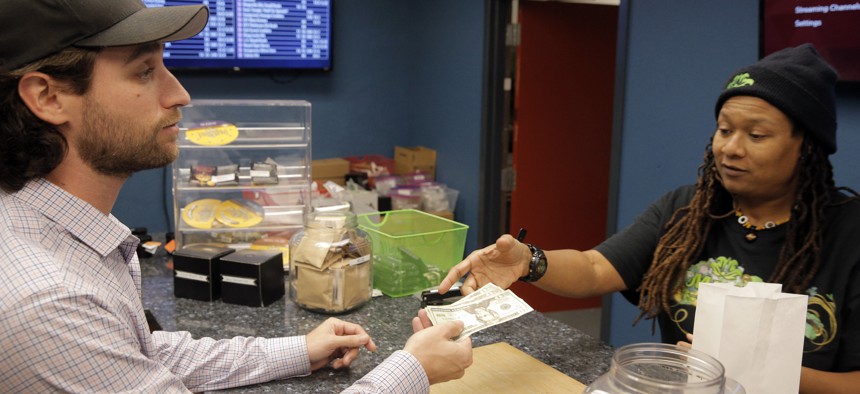Marijuana Banking Reform Left Out of Year-End Spending Deal

Like many businesses working in the cannabis industry, Magnolia Wellness has to deal with a lack of access to formal banking services. Carlos Avila Gonzalez/The San Francisco Chronicle via Getty Images
The proposed changes would have cleared a path for state-regulated marijuana companies to access banking services, instead of doing business primarily in cash.
Changes to federal law supported by state and local governments around the county that would have allowed marijuana businesses to open bank accounts were left out of the $1.7 trillion spending bill unveiled early Tuesday by congressional budget negotiators.
After Maryland and Missouri voters approved ballot measures in November, the recreational use of marijuana by adults is now legal in 21 states, two territories and Washington, D.C. But with the proposal excluded from the "omnibus" spending bill, banks still cannot do business with regulated cannabis firms operating in those places, without risking prosecution for violating laws against "aiding and abetting" federal crimes or money laundering.
Because they are unable to access banking services, the marijuana businesses have to handle large amounts of cash, making them targets for robberies and fueling concerns for local officials about public safety, as well as tax evasion.
Cannabis industry groups and state and local governments have been seeking changes included in legislation known as the SAFE Banking Act, which would prohibit federal regulators from cracking down on banks that work with state-regulated cannabis companies.
A resolution that the U.S. Conference of Mayors passed in June supporting the banking law change noted that one out of every two cannabis dispensaries have been robbed or burglarized, according to the Credit Union National Association, with thefts ranging on average from $20,000 to $50,000.
Citing multiple reports Monday night that the measure would be left out, cannabis industry groups lamented its exclusion.
“In failing to enact the SAFE Banking Act, the Senate missed an opportunity to pass one of the rare pieces of legislation that has the support of both Republicans and Democrats, along with the majority of the American people,” Khadijah Tribble, CEO of the U.S. Cannabis Council, an industry group, said in a statement.
Lawmakers' inaction on the issue "threatens public safety and undermines the progress states are making in mending the racial inequities of the war on drugs," Tribble added. "To say that we are disappointed is an understatement.”
Erik Altieri, executive director of the National Organization for the Reform of Marijuana Laws, or NORML, also decried the outcome.
"Democrats' failure and the GOP's continued resistance to any progress is out of step with voters’ opinion, is bad politics, and most importantly, is bad public policy,” he said in a statement.
“Until congressional action is taken, state-licensed marijuana businesses, the hundreds of thousands of people they employ, and the millions of Americans that patronize them will continue to be at a higher risk of robbery due to the cash-heavy nature of this industry created by outdated federal laws," he added.
The spending bill is likely the last substantial piece of legislation Congress will pass before the holidays and before a Republican majority in the House next year is expected to make agreement on major bills difficult.
“It's not everything we would have wanted,” Democratic Senate Majority Leader Charles Schumer, who supported the banking proposal, said Tuesday morning about the spending bill. “When you're dealing in a bipartisan, bicameral way, you have to sit down and get it done. And that means each side has to concede some things."
Anticipating it would be left out of the spending bill, U.S. Sen. Steve Daines, a Montana Republican pushing for the SAFE Banking Act, blasted its exclusion in a statement Monday night to Punchbowl News.
A spokeswoman for Daines did not respond to an inquiry from Route Fifty. But in the statement to Punchbowl, Daines said, “the failure to pass my ‘SAFE Banking Act’ means communities in Montana and across our country will remain vulnerable to crime where legal businesses are forced to operate in all cash.”
Montana voters approved a ballot measure in 2020 allowing for regulated recreational marijuana and sales began there earlier this year, with sales getting underway earlier this year.
Republican Senate Minority Leader Mitch McConnell opposed efforts to include the banking provisions in the funding deal, saying it was part of a “grab bag” of Democratic “pet priorities" that would make the nation's financial system "more sympathetic to illegal drugs."
McConnell in a speech on the Senate floor on Monday did not mention the banking proposal, but said the omnibus did not include the “left-wing goodies” Democrats had wanted.






